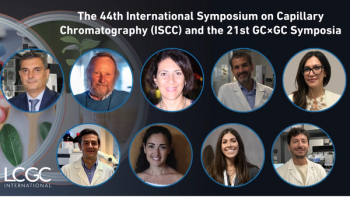
Monday Morning Session Preview: Energy, Petroleum, and Biofuels: Advances in MS Design and Informatics
This Monday morning session will be presided over by Matthew Hurt of Chevron and will be held at 8:30–10:30 a.m. in Ballroom 222/224.
The first presentation in the session will be given by Mathilde Farenc of the University of Rouen (Mont Saint Aignan, France) and is titled “Comparison of Atmospheric Solid Analysis Probe with Other Atmospheric Pressure Ionization Sources by Ion Mobility-Mass Spectrometry Using PetroOrg Software.” Farenc’s group used new software to process the data and compare the various approaches.
The next talk, to be delivered by Mark Barrow of the University of Warwick (Coventry, United Kingdom) is titled “Dissociation of Petroleum Components Using Fourier Transform Ion Cyclotron Resonance Mass Spectrometry.” In this study, three dissociation methods provided complementary information about the composition of petroleum.
Vladislav Lobodin of the National High Magnetic Field Laboratory and the Future Fuels Institute (both in Tallahassee, Florida) will present the next talk, “APCI and APPI-GC/MS-MS for Characterization of the Macondo Crude Oil and the Oil Spill.” Lobodin will describe how the combination of gas chromatography with a soft ionization method and tandem mass spectrometry can improve analysis sensitivity and provide structural information.
The fourth presentation in the session, “Alicyclic Structures in Sediments and Kerogens: Potential Sources of Petroleum,” will be delivered by Patrick Hatcher of Old Dominion University (Norfolk, Virginia). Hatcher and colleagues examined humic extracts of marine sediments with electrospray ionization Fourier transform ion cyclotron resonance mass spectrometry to study the origin of molecules in petroleum.
The penultimate presentation will be given by Maíra Fasciotti of INMETRO (Duque De Caxias, Brazil) and is titled “Algae Biomass Characterization by Traveling Wave Ion Mobility Mass Spectrometry.” Fasciotti will discuss the analysis of the lipid profile in a raw extract of algae biomass.
Finally, Hanyu Zhu of Purdue University (West Lafayette, Indiana) will present “Identification of the Phenol Functionality in Monomeric Lignin Degradation Products via Negative Ion-Molecule Reactions with Diethylmethoxyborane.” This study identified the most commonly observed functionality in monomeric lignin degradation products and showed that certain isomers with both phenol and carboxylic functionalities can be differentiated using the group’s method.
Newsletter
Join the global community of analytical scientists who trust LCGC for insights on the latest techniques, trends, and expert solutions in chromatography.




